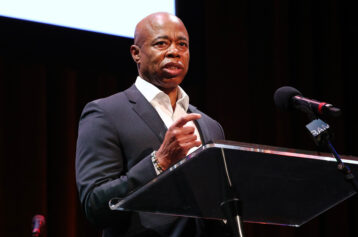The new tone in New York has already become apparent, as newly elected Mayor Bill de Blasio announced today that he would allow the sweeping overhauls to the New York City Police Department ordered by a federal judge last year to be carried out—an abrupt change from former Mayor Michael Bloomberg, who had challenged the judge’s decision in an appeal.
“We’re here today to turn the page on one of the most divisive problems in our city,” de Blasio said at a news conference in Brooklyn. “We believe in ending the overuse of stop-and-frisk that has unfairly targeted young African-American and Latino men.”
The mayor pledged a “commitment to fix the fundamental problems that enabled stop-and-frisk to grow out of control and violate the rights of innocent New Yorkers.”
The reforms ordered by Federal District Court Judge Shira Scheindlin included installing an outside lawyer to monitor the police department’s compliance with the Constitution and directing some officers to wear cameras in a pilot program to record their street interactions. In addition, she had ordered the department to hold community meetings to solicit public comments on overhauling the department’s tactics.
She said the remedies were needed to address “the urgent need to curb the constitutional abuses” and said the unconstitutional stops have exacted a “human toll” in demeaning and humiliating law-abiding citizens.
Scheindlin’s scathing decision in August lashed city officials who had “turned a blind eye” to evidence that officers carried out the searches in a “racially discriminatory manner,” violating individuals’ right to privacy and equal treatment under the law.
“In their zeal to defend a policy that they believe to be effective, they have willfully ignored overwhelming proof that the policy of singling out ‘the right people’ is racially discriminatory and therefore violates the United States Constitution,” the judge wrote.
In a remarkably unusual ruling, a federal appeals court in November threw the entire stop-and-frisk policing strategy into disarray by halting Scheindlin’s sweeping changes, accusing her of judicial misconduct and removing her from the case. It was a stunning victory for Mayor Bloomberg and NYPD chief Ray Kelly just weeks before Bloomberg left office. Bloomberg and city officials had long complained that Scheindlin, who was overseeing three cases related to stop-and-frisk, was biased against the city and the NYPD.
But what a difference an election makes. De Blasio brought along his new police commissioner, William Bratton, and went to the Brownsville Recreation Center in Brooklyn, which reportedly had the highest concentration of police stops in a roughly eight-block area. The mayor invited newly elected Brooklyn Borough President Eric Adams, the former state senator who represented the districts and who over the years had battled Bloomberg and Kelly on stop-and-frisk.
“We will not break the law to enforce the law,” Bratton said. “That’s my solemn promise to every New Yorker, regardless of where they were born, where they live, or what they look like. Those values aren’t at odds with keeping New Yorkers safe — they are essential to long-term public safety.’’
